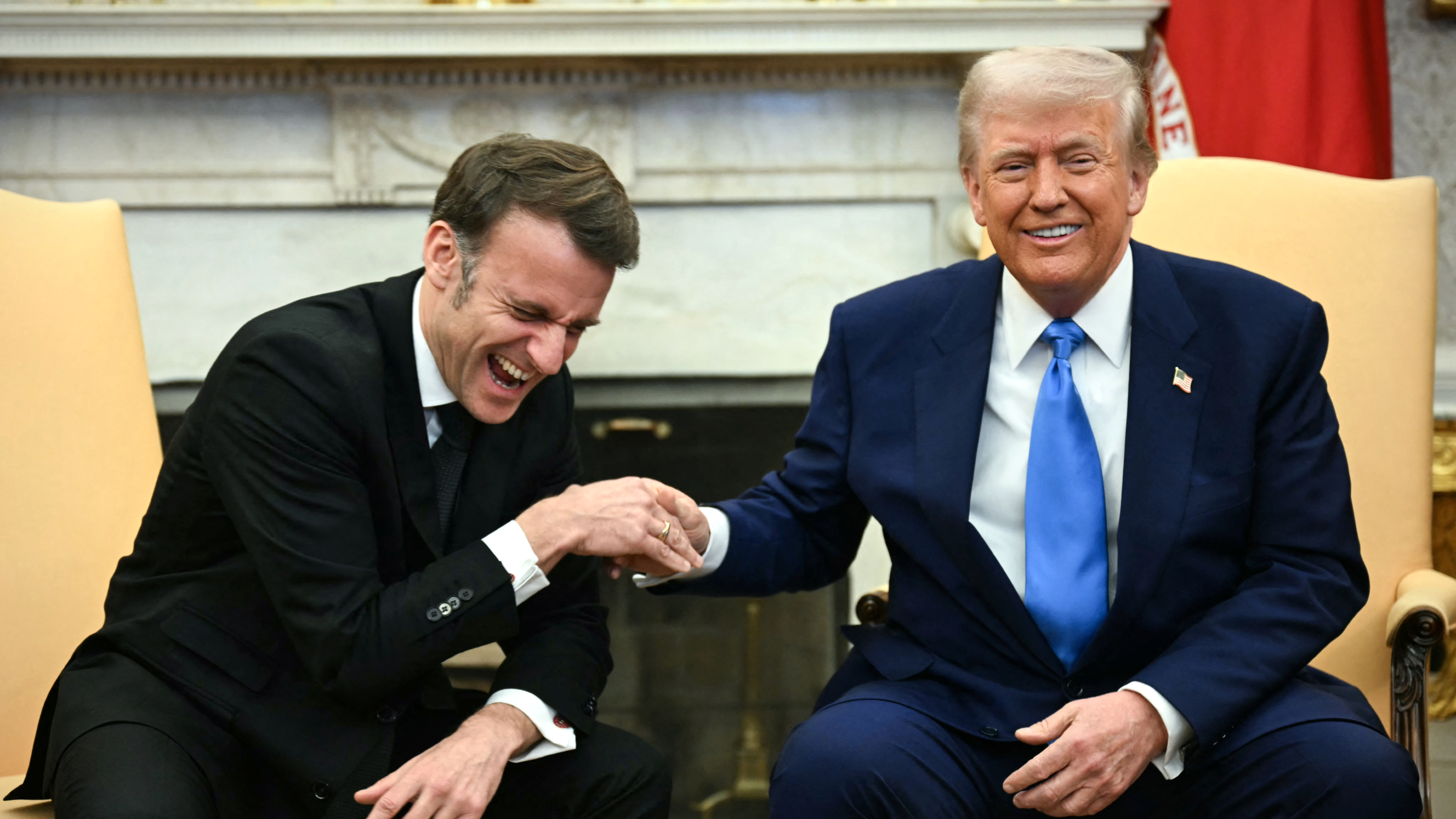Trump sides with Russia on Ukraine war anniversary
The president's embrace of the Kremlin is a reversal of American policy


A free daily email with the biggest news stories of the day – and the best features from TheWeek.com
You are now subscribed
Your newsletter sign-up was successful
What happened
More than a dozen Western leaders traveled to Kyiv Monday to mark the third anniversary of Russia's full-scale invasion. The U.S. did not send a representative. In Washington, French President Emmanuel Macron met with President Donald Trump, seeking to steer him away from his embrace of Russia and back toward Ukraine and America's traditional European allies.
At the United Nations, the U.S. joined Russia, Iran, North Korea and 14 other Moscow allies to vote against a resolution condemning Russia's invasion of Ukraine and calling for the return of Ukrainian territory. The nonbinding resolution passed with the backing of 93 countries.
Who said what
Monday's anniversary followed "a cascade of unwelcome developments for Kyiv," The Associated Press said. Trump called Ukrainian President Volodymyr Zelenskyy a "dictator," suggested Kyiv is to blame for the war and ended Russian President Vladimir Putin's "three-year diplomatic isolation" while starting peace talks with Moscow, sidelining Ukraine.
The Week
Escape your echo chamber. Get the facts behind the news, plus analysis from multiple perspectives.

Sign up for The Week's Free Newsletters
From our morning news briefing to a weekly Good News Newsletter, get the best of The Week delivered directly to your inbox.
From our morning news briefing to a weekly Good News Newsletter, get the best of The Week delivered directly to your inbox.
Macron and Trump Monday "showed a friendly rapport based on years of good ties," but they disagreed on "some key issues" about the Ukraine war, Reuters said. Macron said Putin was the "aggressor" in the conflict and would not respect a "weak" peace agreement with no "deterrence," while Trump suggested Putin could be trusted to uphold a peace deal and declined to call him a dictator as well. "I don't use those words lightly," Trump told reporters. "The two leaders did agree, however, on the deployment of European peacekeeping forces once a peace deal is eventually reached," Reuters said. Trump said Putin, who has publicly rejected the idea, assured him privately he "has no problem with it."
"It's time to end this bloodletting and restore peace, and I think we're going to do it," Trump said. "My administration is making a decisive break with the foreign policy values of the past administration, and, frankly, the past."
What next?
The "blitz of European trips to Washington" to "influence the new administration" continues Thursday with the arrival of British Prime Minister Kier Starmer, The New York Times said. "Russia does not hold all the cards in this war," Starmer said Monday while pledging more than $5 billion in military aid for Kyiv and new sanctions on Russia. "We must increase the pressure even further."
A free daily email with the biggest news stories of the day – and the best features from TheWeek.com
Peter has worked as a news and culture writer and editor at The Week since the site's launch in 2008. He covers politics, world affairs, religion and cultural currents. His journalism career began as a copy editor at a financial newswire and has included editorial positions at The New York Times Magazine, Facts on File, and Oregon State University.
-
 6 of the world’s most accessible destinations
6 of the world’s most accessible destinationsThe Week Recommends Experience all of Berlin, Singapore and Sydney
-
 How the FCC’s ‘equal time’ rule works
How the FCC’s ‘equal time’ rule worksIn the Spotlight The law is at the heart of the Colbert-CBS conflict
-
 What is the endgame in the DHS shutdown?
What is the endgame in the DHS shutdown?Today’s Big Question Democrats want to rein in ICE’s immigration crackdown
-
 Witkoff and Kushner tackle Ukraine, Iran in Geneva
Witkoff and Kushner tackle Ukraine, Iran in GenevaSpeed Read Steve Witkoff and Jared Kushner held negotiations aimed at securing a nuclear deal with Iran and an end to Russia’s war in Ukraine
-
 Pentagon spokesperson forced out as DHS’s resigns
Pentagon spokesperson forced out as DHS’s resignsSpeed Read Senior military adviser Col. David Butler was fired by Pete Hegseth and Homeland Security spokesperson Tricia McLaughlin is resigning
-
 ‘The forces he united still shape the Democratic Party’
‘The forces he united still shape the Democratic Party’Instant Opinion Opinion, comment and editorials of the day
-
 Judge orders Washington slavery exhibit restored
Judge orders Washington slavery exhibit restoredSpeed Read The Trump administration took down displays about slavery at the President’s House Site in Philadelphia
-
 Kurt Olsen: Trump’s ‘Stop the Steal’ lawyer playing a major White House role
Kurt Olsen: Trump’s ‘Stop the Steal’ lawyer playing a major White House roleIn the Spotlight Olsen reportedly has access to significant US intelligence
-
 Hyatt chair joins growing list of Epstein files losers
Hyatt chair joins growing list of Epstein files losersSpeed Read Thomas Pritzker stepped down as executive chair of the Hyatt Hotels Corporation over his ties with Jeffrey Epstein and Ghislaine Maxwell
-
 Judge blocks Hegseth from punishing Kelly over video
Judge blocks Hegseth from punishing Kelly over videoSpeed Read Defense Secretary Pete Hegseth pushed for the senator to be demoted over a video in which he reminds military officials they should refuse illegal orders
-
 Trump’s EPA kills legal basis for federal climate policy
Trump’s EPA kills legal basis for federal climate policySpeed Read The government’s authority to regulate several planet-warming pollutants has been repealed
